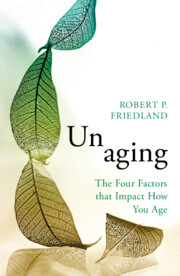Book contents
- Unaging
- Reviews
- Unaging
- Copyright page
- Dedication
- Contents
- List of Figures and Tables
- Preface
- Part I Foundations: What Do We Need to Know about Optimal Aging?
- Part II Applications: What Can We Do about the Opportunity of Aging?
- 12 Overview
- 13 Physical Activity
- 14 Whole Body Health
- 15 Mental Activity
- 16 Psychological Measures
- 17 Social Factors
- 18 Dealing with Stress
- 19 Sleep
- 20 Diet
- 21 Microbial Considerations
- 22 Dental Care
- 23 Dealing with Doctors and Drugs
- 24 Hazardous Behaviors
- 25 Toxic Exposures
- Part III Conclusions
- Acknowledgments
- Glossary
- References
- Index
25 - Toxic Exposures
from Part II - Applications: What Can We Do about the Opportunity of Aging?
Published online by Cambridge University Press: 15 September 2022
- Unaging
- Reviews
- Unaging
- Copyright page
- Dedication
- Contents
- List of Figures and Tables
- Preface
- Part I Foundations: What Do We Need to Know about Optimal Aging?
- Part II Applications: What Can We Do about the Opportunity of Aging?
- 12 Overview
- 13 Physical Activity
- 14 Whole Body Health
- 15 Mental Activity
- 16 Psychological Measures
- 17 Social Factors
- 18 Dealing with Stress
- 19 Sleep
- 20 Diet
- 21 Microbial Considerations
- 22 Dental Care
- 23 Dealing with Doctors and Drugs
- 24 Hazardous Behaviors
- 25 Toxic Exposures
- Part III Conclusions
- Acknowledgments
- Glossary
- References
- Index
Summary
Because their multiple reserves are typically lower, older people are more sensitive to the toxic effects of environmental agents. The liver’s ability to detoxify chemicals declines with age, as well as the ability of the kidney to excrete toxins. Everyone, especially the aged, should limit exposure to environmental toxins, including air pollution, solvents, heavy metals, pesticides, herbicides, and other dangers. Exposure to toxins early in life may lower a person’s physical reserve and result in cognitive impairment with aging. Exposure to pesticides and other toxins has been linked to Parkinson’s. Air pollution is also a risk factor for dementia. Considerable evidence shows that smoking increases the risk of cognitive impairment, stroke, Alzheimer’s, heart disease, and cancer. Excessive alcohol intake can damage several parts of the body and our physical reserve. It can also impair our cognitive reserve through impaired memory and learning. People over age 60 shouldn’t drink more than two doses of alcohol per day for men and one for women. Alcohol abuse can lead to depression and poor psychological reserve with loss of friends causing impaired social reserve. Excess use of alcohol can also contribute to falls, car accidents, liver damage seizures, and stroke.
- Type
- Chapter
- Information
- UnagingThe Four Factors that Impact How You Age, pp. 274 - 278Publisher: Cambridge University PressPrint publication year: 2022

